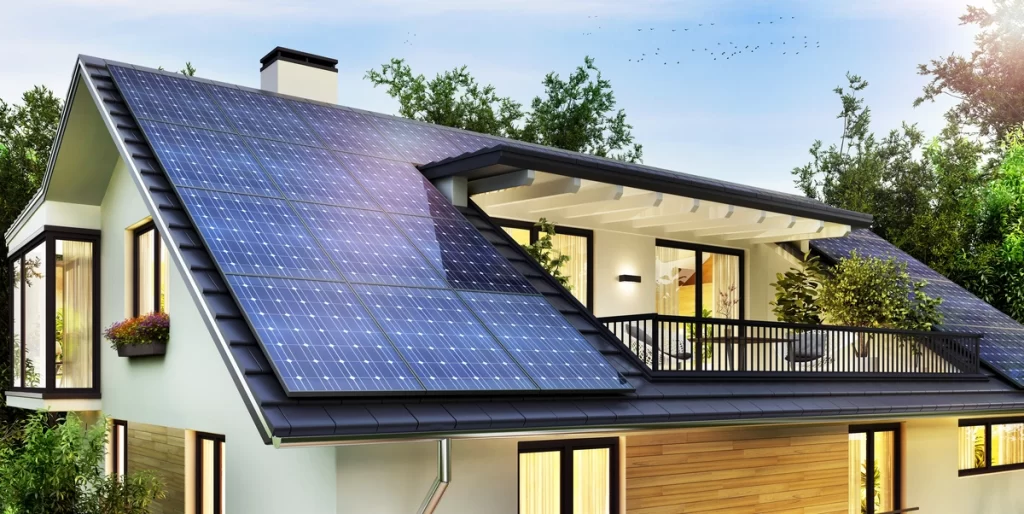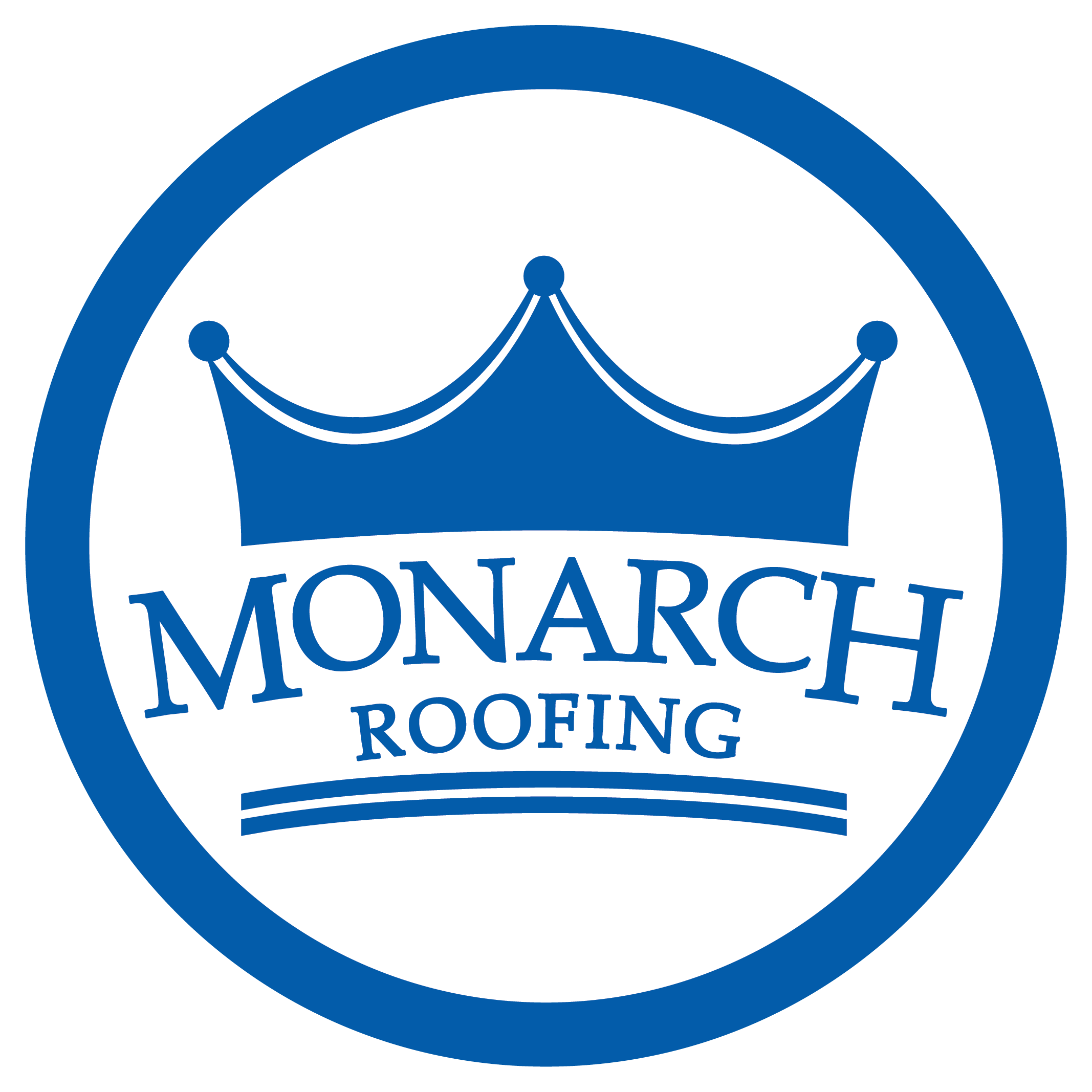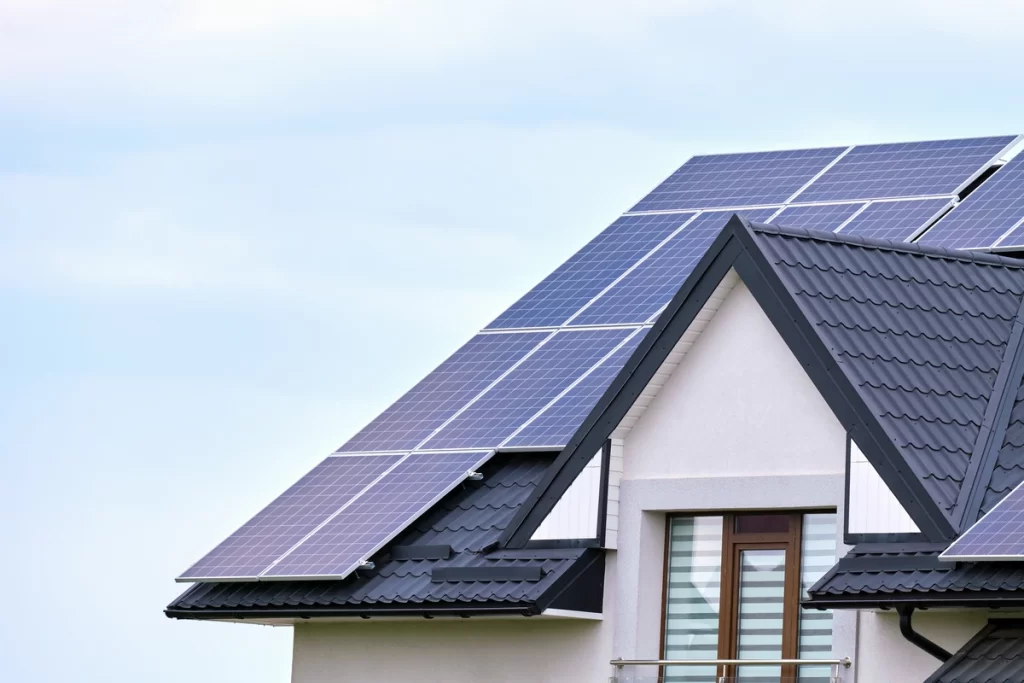In the quest for a sustainable and eco-friendly future, solar panels have emerged as a powerful solution for harnessing clean and renewable energy from the sun. As more homeowners and businesses embrace the benefits of solar power, one crucial aspect to consider is the type of roof that works best for solar panel installation.
Interested in solar roofing panels or shingles for your home?
In this blog post, we will explore:
- The pros and cons of solar panels
- The best roof for solar panels
- Finding a qualified contractor to make your solar dreams a reality
Pros and Cons of Solar Panels
Before we dive into the ideal roof types for solar panels, it’s essential to understand the advantages and disadvantages of solar panel installations.
👍 Pros of Solar Panels:
- Clean Energy Source: Solar panels generate electricity from sunlight, a clean and renewable energy source, reducing your reliance on fossil fuels and lowering your carbon footprint.
- Energy Cost Savings: Solar panels can significantly reduce your electricity bills, and in some cases, you may even generate surplus energy that can be sold back to the grid, further offsetting your costs.
- Environmental Benefits: Solar power reduces air and water pollution and helps combat climate change, making it an environmentally responsible choice.
- Energy Independence: By generating your electricity, you become less dependent on utility companies, providing greater control over your energy production and consumption.
- Government Incentives: Many governments offer financial incentives, tax credits, and rebates to encourage solar panel adoption, making it a more affordable option.
👎 Cons of Solar Panels:
- High Initial Costs: The upfront cost of purchasing and installing solar panels can be relatively high, although it often pays off over time through energy savings.
- Intermittent Energy Generation: Solar power generation is dependent on sunlight, meaning energy production may drop during cloudy days or at night. However, this can be mitigated with battery storage systems.
- Aesthetic Concerns: Some homeowners may find the appearance of solar panels on their roofs unattractive, although there are sleek and integrated design options available.
- Maintenance and Repairs: Solar panels require regular maintenance and occasional repairs, which can add to the overall cost of ownership.
- Roof Compatibility: The suitability of your roof for solar panel installation is a critical factor to consider. Not all roofs are equally suitable for solar panels.
7 Best Roof Types for Solar Panels
Choosing the right roof type for your solar panel installation is crucial to ensure maximum efficiency, longevity, and safety. Here are some of the best roof types for solar panels:
1) Composite Shingle Roofs:
Composite shingle roofs are one of the most common and ideal choices for solar panel installations. They are durable, easy to work with, and can support the weight of solar panels without issues. Additionally, solar panels can be easily integrated into the existing roofing structure, creating a seamless and visually appealing installation.
2) Metal Roofs:
Metal roofs, such as steel, aluminum, or copper, are excellent candidates for solar panel installations. They are long-lasting, durable, and can withstand various weather conditions. Moreover, metal roofs often have smooth surfaces, making them conducive to easy and secure solar panel mounting.
3) Tile Roofs:
Tile roofs, commonly found in Mediterranean and Spanish-style architecture, can also accommodate solar panels. However, the installation process may be slightly more complex, and extra care is needed to avoid damaging the tiles. Specialized solar mounting systems designed for tile roofs are available to ensure a secure fit.
4) Flat Roofs:
Flat roofs, commonly found on commercial buildings, can be ideal for solar panel installations. Solar panels can be mounted at an optimal angle for sun exposure, maximizing energy production. Flat roof installations often utilize ballasted racking systems to secure the panels without penetrating the roof membrane.
5) Standing Seam Metal Roofs:
Standing seam metal roofs, characterized by their raised seams, offer an easy and secure mounting surface for solar panels. The panels can be attached directly to the seams without compromising the roof’s integrity, making it a popular choice for both residential and commercial installations.
6) TPO and PVC Membrane Roofs:
These single-ply roofing membranes are commonly used on flat and low-slope roofs. Solar panels can be mounted on TPO and PVC roofs using non-penetrating ballast or a lightweight racking system designed for membrane roofs.
7) Slate Roofs:
While slate roofs can be challenging to work with due to their weight and fragility, they can still support solar panels when installed correctly. Care must be taken to ensure that the installation does not compromise the integrity of the slate tiles.
How to Find a Qualified Contractor for Solar Panel Installation

Now that you know which roof types are suitable for solar panels, the next crucial step is finding a qualified contractor to install your solar panels. Here’s a step-by-step guide to help you find the right professional for the job:
- Research Local Installers: Start by researching local solar panel installation companies. Look for established firms with a strong track record of successful installations and positive customer reviews.
- Check Licensing and Certification: Ensure that the contractors you consider are licensed and certified to install solar panels in your area. Licensing requirements vary by state and locality, so be sure to verify their credentials.
- Request Multiple Quotes: Contact several reputable contractors and request detailed quotes for your solar panel installation project. Compare their pricing, warranties, and the quality of materials and equipment they offer.
- References and Reviews: Ask for references from previous customers and check online reviews to gauge the contractor’s reputation. Reputable contractors should have no problem providing references to vouch for their work.
- Evaluate Experience: Choose a contractor with extensive experience in solar panel installations, preferably with a portfolio showcasing completed projects similar to yours.
- Check Insurance: Verify that the contractor carries liability insurance and worker’s compensation coverage. This protects you from liability in case of accidents or damages during the installation process.
- Understand the Warranty: Review the warranty offered by the contractor. A reputable installer should provide warranties for both the solar panels and the installation workmanship.
- Ask About Financing Options: Inquire about financing options or incentives offered by the contractor. Some companies may provide financing plans or help you navigate available government incentives and rebates.
- Get Everything in Writing: Once you’ve selected a contractor, make sure to get a detailed written contract that outlines all project details, including costs, timelines, equipment specifications, and warranties.
- Permitting and Inspection: Your chosen contractor should handle the necessary permits and inspections required for your solar panel installation. Ensure they have experience navigating local regulations.
Work With Your Local Solar Panel Installers
Solar panels are an excellent investment for both homeowners and businesses looking to reduce energy costs, minimize their environmental impact, and achieve energy independence. To maximize the benefits of solar panels, it’s essential to choose the right roof type and a qualified contractor for installation.
At Monarch Roofing, we’re proud to be the go-to choice for local residents looking to invest in solar panels. Ready to take the plunge? Contact us today for a quote.






